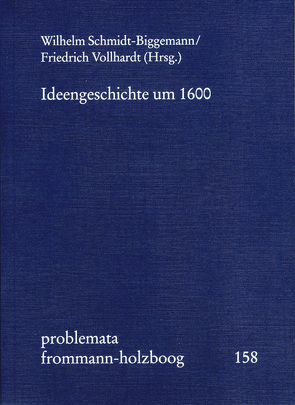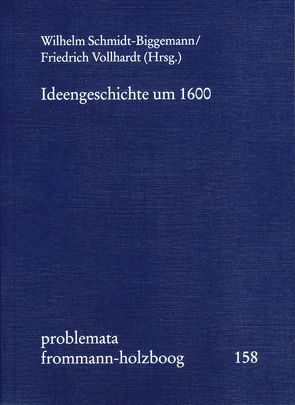
Die Jahrzehnte um 1600 sind in Europa von einer nervösen wissenschaftlichen und religiösen Aktivität bestimmt. Die Konfessionen sind alles andere als stabil, die Kirchen und Staaten kämpfen mit harten politischen Mitteln darum, sich gegen Zentrifugalkräfte zu behaupten. Denn unterhalb der institutionell gefestigten Mächte wirkt ein dynamisches Potential an Ideen weiter, das sich den dogmatischen Stabilisatoren nicht fügen wollte. Die zentralen, lange wirksamen Topoi stammen aus dem Florentiner hermetischen Neuplatonismus, der spätmittelalterlichen Apokalyptik und der Reformation. Nur vor dem Hintergrund dieser geschichtstheologischen Erwartungen, die sich auch auf die Erlösung und Vollendung der Natur beziehen, sind Bewegungen wie der Paracelsismus, Valentin Weigels und Jakob Böhmes Naturtheologie, Giordano Brunos Pantheismus, die Blüte der christlichen Kabbala bei Heinrich Khunrath, Robert Fludd und Athanasius Kircher, die mit der Wirkung des Corpus Hermeticum koinzidiert, der Langzeiterfolg von Johann Arndts Wahrem Christentum oder auch die Wirkung der Rosenkreuzerschriften Johann Valentin Andreaes zu begreifen. Diese Spannungen werden sich im Dreißigjährigen Krieg politisch und theologisch entladen und, weil sie nicht nationalstaatlich gelöst werden können, die deutsche Entwicklung noch lange bestimmen. Das gilt nicht nur für die Politik, sondern auch für die Ideengeschichte; ihre Langzeitwirkung reicht über den Pietismus bis in die Deutsche Romantik und darüber hinaus. – Mit dem vorliegenden Band wird erstmals der Versuch unternommen, die Geistesgeschichte am Vorabend des Dreißigjährigen Krieges als Panorama zusammenzufassen. Über die formale Charakterisierung als »Späthumanismus« hinaus werden nicht nur die formalen Bedingungen des gelehrten Austausches – Briefkultur, Respublica literaria, Orientierung an der Antike – dargestellt, sondern auch theologische, naturphilosophische, kultur- und denkgeschichtliche Strukturen sichtbar, welche die Zeit um 1600 als Epoche mit eigenem Profil konturieren.
During the decades around the year 1600, Europe is characterised by frantic scientific and religious activity. Religious denominations are anything but stable, while churches and nations deploy all the political means at their disposal in order to prevail against the centrifugal forces that afflict them – for below the level of institutionally entrenched powers, a dynamic potential of ideas that refuses to submit to dogmatic stabilisers continues to exert its influence. Its central, long-lasting topoi originate from Florentine hermetic Neoplatonism, late medieval apocalyptic literature and the Reformation.
It is only against the backdrop of these historico-theological expectations in regard to the redemption and ultimate completion of nature that intellectual phenomena like Paracelsism, Valentin Weigel‹s and Jakob Böhme‹s natural theology, Giordano Bruno's pantheism, the flowering of Christian Kabbalah as practised by Heinrich Khunrath, Robert Fludd and Athanasius Kircher (which in turn coincides with the impact of the Corpus Hermeticum), the long-term success of Johann Arnd‹s True Christianity as well as the effect of Johann Valentin Andreae‹s Rosicrucian writings can be properly understood.
Erupting politically and theologically in the Thirty Years‹ War, these tensions will have a lasting influence on the course of German history due to the absence of a nation state capable of resolving them. This holds true not only for the realm of politics, but also for the history of ideas; the long-term effects of these tensions extend via Pietism to German Romanticism and beyond.
This volume is the first attempt to provide a panoramic summary of intellectual history on the eve of the Thirty Years‹ War. On top of characterising these phenomena as instances of »Late Humanism,» this survey not merely describes the formal conditions of learned interchange (letter culture, respublica literaria, orientation towards antiquity), but also renders visible relevant structures in fields as diverse as theology, natural philosophy, cultural history or the history of ideas, structures which clearly suggest that the years around 1600 can be regarded as a period of its own with a distinct and specific profile.
Aktualisiert: 2021-01-26
Autor:
Günter Bonheim,
Norbert Brieskorn,
Eckhart Holzboog,
Wilhelm Kühlmann,
Cecilia Muratori,
Claudia Olk,
Sascha Salatowsky,
Wilhelm Schmidt-Biggemann,
Johann Anselm Steiger,
Gideon Stiening,
Friedrich Vollhardt,
Volkhard Wels

During the decades around the year 1600, Europe is characterised by frantic scientific and religious activity. Religious denominations are anything but stable, while churches and nations deploy all the political means at their disposal in order to prevail against the centrifugal forces that afflict them – for below the level of institutionally entrenched powers, a dynamic potential of ideas that refuses to submit to dogmatic stabilisers continues to exert its influence. Its central, long-lasting topoi originate from Florentine hermetic Neoplatonism, late medieval apocalyptic literature and the Reformation.
It is only against the backdrop of these historico-theological expectations in regard to the redemption and ultimate completion of nature that intellectual phenomena like Paracelsism, Valentin Weigel‹s and Jakob Böhme‹s natural theology, Giordano Bruno's pantheism, the flowering of Christian Kabbalah as practised by Heinrich Khunrath, Robert Fludd and Athanasius Kircher (which in turn coincides with the impact of the Corpus Hermeticum), the long-term success of Johann Arnd‹s True Christianity as well as the effect of Johann Valentin Andreae‹s Rosicrucian writings can be properly understood.
Erupting politically and theologically in the Thirty Years‹ War, these tensions will have a lasting influence on the course of German history due to the absence of a nation state capable of resolving them. This holds true not only for the realm of politics, but also for the history of ideas; the long-term effects of these tensions extend via Pietism to German Romanticism and beyond.
This volume is the first attempt to provide a panoramic summary of intellectual history on the eve of the Thirty Years‹ War. On top of characterising these phenomena as instances of »Late Humanism,» this survey not merely describes the formal conditions of learned interchange (letter culture, respublica literaria, orientation towards antiquity), but also renders visible relevant structures in fields as diverse as theology, natural philosophy, cultural history or the history of ideas, structures which clearly suggest that the years around 1600 can be regarded as a period of its own with a distinct and specific profile.
Aktualisiert: 2023-03-14
Autor:
Günter Bonheim,
Norbert Brieskorn,
Eckhart Holzboog,
Wilhelm Kühlmann,
Cecilia Muratori,
Claudia Olk,
Sascha Salatowsky,
Wilhelm Schmidt-Biggemann,
Johann Anselm Steiger,
Gideon Stiening,
Friedrich Vollhardt,
Volkhard Wels
MEHR ANZEIGEN
Bücher von Bonheim, Günter
Sie suchen ein Buch oder Publikation vonBonheim, Günter ? Bei Buch findr finden Sie alle Bücher Bonheim, Günter.
Entdecken Sie neue Bücher oder Klassiker für Sie selbst oder zum Verschenken. Buch findr hat zahlreiche Bücher
von Bonheim, Günter im Sortiment. Nehmen Sie sich Zeit zum Stöbern und finden Sie das passende Buch oder die
Publiketion für Ihr Lesevergnügen oder Ihr Interessensgebiet. Stöbern Sie durch unser Angebot und finden Sie aus
unserer großen Auswahl das Buch, das Ihnen zusagt. Bei Buch findr finden Sie Romane, Ratgeber, wissenschaftliche und
populärwissenschaftliche Bücher uvm. Bestellen Sie Ihr Buch zu Ihrem Thema einfach online und lassen Sie es sich
bequem nach Hause schicken. Wir wünschen Ihnen schöne und entspannte Lesemomente mit Ihrem Buch
von Bonheim, Günter .
Bonheim, Günter - Große Auswahl an Publikationen bei Buch findr
Bei uns finden Sie Bücher aller beliebter Autoren, Neuerscheinungen, Bestseller genauso wie alte Schätze. Bücher
von Bonheim, Günter die Ihre Fantasie anregen und Bücher, die Sie weiterbilden und Ihnen wissenschaftliche Fakten
vermitteln. Ganz nach Ihrem Geschmack ist das passende Buch für Sie dabei. Finden Sie eine große Auswahl Bücher
verschiedenster Genres, Verlage, Schlagworte Genre bei Buchfindr:
Unser Repertoire umfasst Bücher von
Sie haben viele Möglichkeiten bei Buch findr die passenden Bücher für Ihr Lesevergnügen zu entdecken. Nutzen Sie
unsere Suchfunktionen, um zu stöbern und für Sie interessante Bücher in den unterschiedlichen Genres und Kategorien
zu finden. Neben Büchern von Bonheim, Günter und Büchern aus verschiedenen Kategorien finden Sie schnell und
einfach auch eine Auflistung thematisch passender Publikationen. Probieren Sie es aus, legen Sie jetzt los! Ihrem
Lesevergnügen steht nichts im Wege. Nutzen Sie die Vorteile Ihre Bücher online zu kaufen und bekommen Sie die
bestellten Bücher schnell und bequem zugestellt. Nehmen Sie sich die Zeit, online die Bücher Ihrer Wahl anzulesen,
Buchempfehlungen und Rezensionen zu studieren, Informationen zu Autoren zu lesen. Viel Spaß beim Lesen wünscht Ihnen
das Team von Buchfindr.

